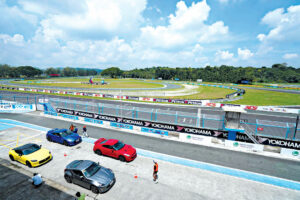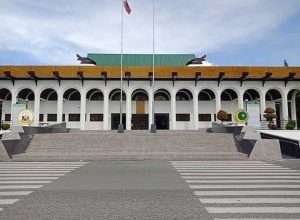The lifting of the constitutional 60-40 foreign ownership rule: Credible commitment, the PIATCO Scandal, and mistrust

My take on the development experience of nations is that all progress boils down to investment — specifically on the share of income that the nation sets aside for investment or what is called the Investment Rate, or the share of investment spending in GDP. Countries that invest less will, over time, eat the dust of countries that invest more. The investment rate depends on the rules binding on investors. The rules of one jurisdiction (country) determine the risk-adjusted profit rate that can be reasonably expected from an investment in that jurisdiction.
The county’s investment has to be financed. The first source of investment financing is domestic savings, viz., the percentage of GDP it sets aside for the future. Countries that save more have greater leeway for financing investment domestically; those that save less need more outside savings (foreign investment) to keep up. The accompanying table shows the Investment rates and the savings rates for selected Asian Countries in 2022 (the GlobalEconomy.com).
Note that the Philippines had the lowest investment rate in 2022 (22.4%). It also had the lowest savings rate (22%). Note that 2022 is typical of the Philippine experience in the last 40 years. China (PRC) has the highest on both counts. Vietnam, the odds-on favorite to make OECD status next, leads the Philippines in each count by 10%. The standard in the Asean is 25-35% in either count. Three years after CREATE 2, which was sold as investment booster, we still have to breach the standard.
The investment and savings rate are markers of how we regard our children’s future. It seems that the cynical adage, “Eat, drink and be merry for tomorrow we die,” is truer among Filipinos than among our neighbors. Why? Could it be that we are more obsessed with reward in the afterlife than our neighbors? Could it alternatively be that we are living the nightmare in the famous saying, “I would rather have a government run like hell by Filipinos than a government run like heaven by Americans,” (President Manuel L. Quezon, 1939)? We refuse to learn from beho mangbobote (the old scrap trader) so manifest in our midst and captured in the observation: “When a Pinoy earns just enough to buy a tricycle, he buys a car; when a beho Tsinoy (old Chinese-Filipino) earns enough to buy a car, he buys a tricyle.”
We have privileged consumption over saving and investment as a nation. And government has been cheerleading the national consumption binge: our Government Capital Outlay (GCO) was <5% of GDP for those four decades while it was between 6-10% of GDP among the ASEAN. We still have to reach the ASEAN standard. But we have the most generous senior discount in the world, the most generous Military and Uniformed Personnel (MUP) entitlement, free tertiary education, etc., which are consumption-oriented while being blatant transfers to the upper income class. For decades we had subsidized SUVs and car ownership with subsidized gas prices by the then OPSF (Oil Price Stabilization Fund) which left no money in the till for proper infrastructure. Is it any surprise that our infrastructure endowment is 20 years behind our ASEAN rivals? And every time a crisis erupts, our national response is tapunan mo ng pera (to throw money at it): another department, another agency, another administration czar. As one of the MMDA (Metropolitan Manila Development Authority) executive in the Marcos pere era once reacted to snags in the ballyhooed national fishpond project: “Tapunan mo ng pera ang PI na iyan kung hindi yumoko.” (Throw money at that SOB and he will bend).
The reasons why our investment rate is abysmal makes a litany; we have closed many economic sectors from investment, both local and foreign — agriculture was closed for all that time from large private investors because of property rights chaos stemming from CARP (Comprehensive Agrarian Reform Program) and the resulting land fragmentation; Mining and Forestry were forbidden destinations for domestic private and foreign investment in the last decade. The $6-billion Tampakan Gold and Copper Mine project is still in limbo after 40 years because of unresolved conflicts of principles. We have the highest power cost in the ASEAN apart from Singapore; please note Philippine rates for large establishments are the highest in the ASEAN but household rates are the lowest in the ASEAN. Why? Because the government is generous as long as the private sector bankrolls the entitlements. We have rule of law on red flags because the government wants low tariffs — say, for water, but being unable or unwilling to collect proper taxes, would have the private sector bankroll it. The private sector now partners with a budget-strapped government to engender public infrastructure thanks to the PPP (public-private partnership) law; the lifting of Section 11 Article 12 can be viewed as another PPP modality but now with bearers of foreign savings apart from starting the pull down of the whole anti-investment ecology.
Senator Grace Poe and erstwhile Supreme Court Justice Tony Carpio correctly pointed out in one Senate hearing that we have already leapfrogged some deleterious constitutional hurdles through laws and/or amendments thereof, such as the PSA (Public Service Act) and RTL (Rice Tariffication Law). Why tweak the constitution itself? Laws are easier to reverse than constitutional provisions. The Supreme Court is currently deliberating on whether the new PSA law is constitutional: PSA could just be scratched tomorrow. Constitutional provisions are way more difficult to change. The name of the game is credible commitment, facts on the ground that one cannot easily walk back on. The more credible the commitment devise produced, the better for foreign investors. Recall the worldwide “to do” over People’s Republic of China’s amending its constitution to legalize private property in 2004. Previously, property was theft in the Proudhon-left tradition.
We can debate till doomsday how much foreign investment we lost and will lose as a consequence of Section 11 Article XII. What is not debatable is how much it has cost us already in one particular case, the Terminal 3-Philippine International Air Terminals Co., Inc. (PIATCO) scandal: the construction of Terminal 3 of the Ninoy Aquino International Airport or NAIA attracted foreign interest, among them Fraport. But the ownership restriction on foreign ownership meant that the foreign interest cannot wholly own and run the facility. Fraport needed a local partner to pose as majority owner (some say a dummy). It found one, but the partner was embroiled in corruption cases leading to lawsuits that caused the completed Terminal 3 to be mothballed for a decade since delivery in 2002. In 2016, the Philippine Supreme Court, confirming an arbitral ruling, ordered the Philippine government to indemnify PIATCO P25 billion. Had the ownership restriction not been there, Terminal 3 would have been running and earning since 2002 and the P25 billion indemnity would have been avoided. Twenty-five billion pesos was the cost of the foreign ownership restriction in just this one case.
For the next decade, PIATCO was the red flag that popped out on the screens of global foreign investors. It said: “Beware the Philippines!”
Article XII Section 11 on “National Economy and Patrimony” was a policy instrument that the 1987 Constitutional framers thought may advance national welfare. The unspoken premise: “That native born capitalists are better stewards of the national patrimony than foreign born ones.” But this is an article of faith, not a demonstrated fact. Native-born carpetbaggers are no less rapacious than foreign-born ones. We are gifted by heaven with a national patrimony; but we abdicate our right if we fail to make it flower. Whoever, regardless of birth, can make the land flower should have it by right. The Gospel has a grim warning for those who bury their talents: “So take the talent from him and give it to him who has 10 talents… and cast the worthless servant into the outer darkness.” (Mathew 25: 14-30)
I support the proposal to lift Section 11 of Article XII, and indeed all other policy instruments such as land reform masquerading as basic values in the 1987 Constitution that the framers thought the future lawmakers had not enough wisdom to weigh in on. I will not follow St. Augustine of Hippo who, before conversion, prayed, “Lord make me chaste but not yet.” Instead, I take a cue from Voltaire who said “L’ennemi du bien est la bien.” (The perfect is the enemy of the good).
Have a blessed Holy Week ahead!
Raul V. Fabella is a retired professor of the UP School of Economics, a member of the National Academy of Science and Technology, and an honorary professor at the Asian Institute of Management. He gets his dopamine fix from tending flowers with wife Teena, pedal biking, and assiduously courting, if with little success, the guitar.




